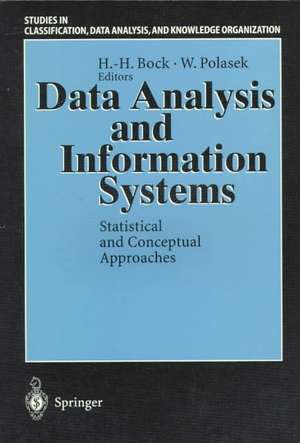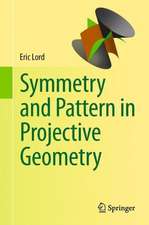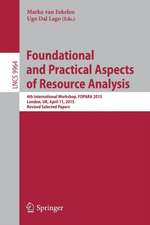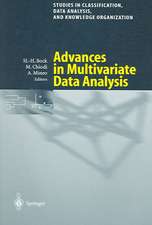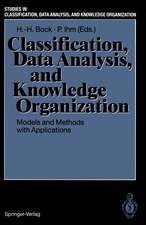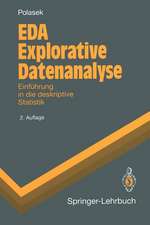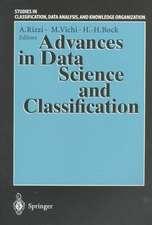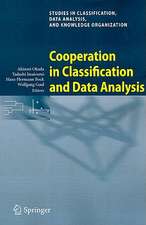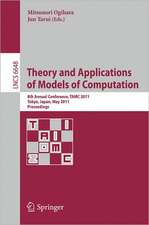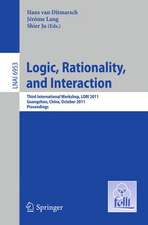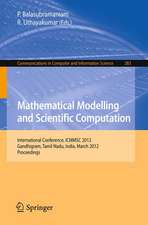Data Analysis and Information Systems: Statistical and Conceptual Approaches Proceedings of the 19th Annual Conference of the Gesellschaft für Klassifikation e.V. University of Basel, March 8–10, 1995: Studies in Classification, Data Analysis, and Knowledge Organization
Editat de Hans-Hermann Bock, Wolfgang Polaseken Limba Engleză Paperback – 18 mar 1996
Din seria Studies in Classification, Data Analysis, and Knowledge Organization
- 20%
 Preț: 754.10 lei
Preț: 754.10 lei - 20%
 Preț: 1203.32 lei
Preț: 1203.32 lei -
 Preț: 389.49 lei
Preț: 389.49 lei - 20%
 Preț: 587.30 lei
Preț: 587.30 lei - 18%
 Preț: 886.26 lei
Preț: 886.26 lei - 15%
 Preț: 654.43 lei
Preț: 654.43 lei - 18%
 Preț: 968.30 lei
Preț: 968.30 lei - 18%
 Preț: 1017.26 lei
Preț: 1017.26 lei -
 Preț: 417.41 lei
Preț: 417.41 lei - 18%
 Preț: 1113.09 lei
Preț: 1113.09 lei - 15%
 Preț: 645.14 lei
Preț: 645.14 lei - 15%
 Preț: 660.04 lei
Preț: 660.04 lei - 20%
 Preț: 583.38 lei
Preț: 583.38 lei - 15%
 Preț: 637.59 lei
Preț: 637.59 lei -
 Preț: 406.05 lei
Preț: 406.05 lei - 20%
 Preț: 997.38 lei
Preț: 997.38 lei - 18%
 Preț: 958.07 lei
Preț: 958.07 lei - 18%
 Preț: 949.06 lei
Preț: 949.06 lei - 18%
 Preț: 784.13 lei
Preț: 784.13 lei - 20%
 Preț: 999.53 lei
Preț: 999.53 lei - 18%
 Preț: 1391.52 lei
Preț: 1391.52 lei - 18%
 Preț: 964.10 lei
Preț: 964.10 lei - 18%
 Preț: 962.35 lei
Preț: 962.35 lei - 15%
 Preț: 649.71 lei
Preț: 649.71 lei - 20%
 Preț: 1013.06 lei
Preț: 1013.06 lei - 15%
 Preț: 652.81 lei
Preț: 652.81 lei - 15%
 Preț: 647.73 lei
Preț: 647.73 lei - 20%
 Preț: 585.30 lei
Preț: 585.30 lei - 24%
 Preț: 795.80 lei
Preț: 795.80 lei - 20%
 Preț: 1464.66 lei
Preț: 1464.66 lei - 20%
 Preț: 559.44 lei
Preț: 559.44 lei - 15%
 Preț: 647.59 lei
Preț: 647.59 lei - 15%
 Preț: 650.04 lei
Preț: 650.04 lei - 15%
 Preț: 647.73 lei
Preț: 647.73 lei -
 Preț: 398.15 lei
Preț: 398.15 lei - 20%
 Preț: 572.09 lei
Preț: 572.09 lei - 15%
 Preț: 639.59 lei
Preț: 639.59 lei - 15%
 Preț: 683.40 lei
Preț: 683.40 lei - 15%
 Preț: 695.01 lei
Preț: 695.01 lei -
 Preț: 423.34 lei
Preț: 423.34 lei - 18%
 Preț: 945.30 lei
Preț: 945.30 lei - 15%
 Preț: 652.64 lei
Preț: 652.64 lei -
 Preț: 391.40 lei
Preț: 391.40 lei - 20%
 Preț: 561.12 lei
Preț: 561.12 lei - 20%
 Preț: 1002.67 lei
Preț: 1002.67 lei - 15%
 Preț: 640.37 lei
Preț: 640.37 lei - 20%
 Preț: 996.88 lei
Preț: 996.88 lei - 20%
 Preț: 1007.46 lei
Preț: 1007.46 lei - 15%
 Preț: 646.11 lei
Preț: 646.11 lei
Preț: 657.25 lei
Preț vechi: 773.23 lei
-15% Nou
Puncte Express: 986
Preț estimativ în valută:
125.77€ • 134.49$ • 104.86£
125.77€ • 134.49$ • 104.86£
Carte tipărită la comandă
Livrare economică 17 aprilie-01 mai
Preluare comenzi: 021 569.72.76
Specificații
ISBN-13: 9783540607748
ISBN-10: 3540607749
Pagini: 564
Ilustrații: XIV, 548 p. 28 illus.
Dimensiuni: 170 x 242 x 30 mm
Greutate: 0.89 kg
Ediția:Softcover reprint of the original 1st ed. 1996
Editura: Springer Berlin, Heidelberg
Colecția Springer
Seria Studies in Classification, Data Analysis, and Knowledge Organization
Locul publicării:Berlin, Heidelberg, Germany
ISBN-10: 3540607749
Pagini: 564
Ilustrații: XIV, 548 p. 28 illus.
Dimensiuni: 170 x 242 x 30 mm
Greutate: 0.89 kg
Ediția:Softcover reprint of the original 1st ed. 1996
Editura: Springer Berlin, Heidelberg
Colecția Springer
Seria Studies in Classification, Data Analysis, and Knowledge Organization
Locul publicării:Berlin, Heidelberg, Germany
Public țintă
ResearchCuprins
Section 1: Classification and Clustering.- MDL for Mixtures of Normal Distributions.- A New Algorithm for Two-Mode Clustering.- Computational Methods in Clustering from a Mathematical Programming Viewpoint.- Classification of Time Series with Optimized Time-Frequency Representations.- Cluster Analysis Using Spatial Autocorrelation.- Bounds for p-values of Combinatorial Tests for Clustering in Epidemiology.- Probability Distributions on Indexed Dendrograms and Related Problems of Classifiability.- On the Validation of Classification Trees.- Section 2: Uncertainty and Fuzziness.- Modeling Weak Information with Generalized Basic Probability Assignments.- Validity Measures for Fuzzy Partitions.- Uncertainty and Actor-Oriented Information Retrieval in µ-AKCESS. An Approach Based on Fuzzy Set Theory.- The “Combination Problem” for Probability Intervals: Necessary Assumptions.- A Classification System for Uncertainty Theories: How to Select an Appropriate Formalism?.- Section 3: Methods of Data Analysis and Applications.- Analyzing Paired Comparisons Data Using Probabilistic Ideal Point Models and Probabilistic Vector Models.- Consensus Rules for Molecular Sequences: Open Problems.- Latent Dimensions of Managers’ Risk Perception: An Application of Correspondence Analysis.- Analysis of the Behaviour of New Car Buyers.- Statistical Analysis of Spatial Data in Geographic Information Systems.- Analysis of Spatio-Temporal Data Using Interactive Statistical Graphics.- Representation of Finite Ordinal Data in Real Vector Spaces.- Section 4: Statistical Models and Methods.- Statistical Models and Artificial Neural Networks.- Smoothing for Categorical Data: Discrete Kernel Regression and Local Likelihood Approaches.- Computer-based Design of Experiments in Industry.- TestingSimple Hypotheses.- Section 5: Bayesian Learning.- Bayesian Hierarchical Models for Random Routes in Finite Populations.- Metropolis Sampling in Bilinear Time Series Models.- Exact Likelihood Function Forms for an ARFIMA Process.- Learning about Degradation Models and Prognostic Factors.- Bayesian Classification Using Predictive Diagnostic Measures.- Section 6: Conceptual Classification, Knowledge Ordering and Information Systems.- On the Relationship between Description Logics and Conceptual Graphs with some References to the Medical Domain.- The Design of an Interpreter for Dialog-Controlled Rule Systems.- Conceptual Classifications and Nomenclatures in Medicine.- A Method for the Detection of Sources in the Logic Information System LIS.- Two Conceptual Approaches to Acquire Human Expert Knowledge in a Complex Real World Domain.- Terminology and Knowledge Representation in Complex Domains.- Knowledge Spaces and Formal Concept Analysis.- A Deductive Approach for Knowledge Base Refinement in Expert Systems and its Application to Credit Analysis.- Knowledge Representation of Pathological States.- Attribute Exploration with Background Implications and Exceptions.- Integrating an OR Model Base into a Knowledge-Based System for Marketing Data Analysis.- LIS/THESAURUS: A Model for Structuring and Representing Concepts of Mathematical Logic.- Section 7: Linguistics and Dialectometry.- Gender Classification of German Nouns: Symbolic and Sub-Symbolic Approaches.- Automatic Inference of DATR Theories.- Probability Distributions of Polysemantic Expressions.- German Dialectometry.- Subject Index (including List of Authors).
